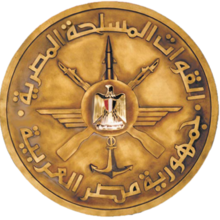Shams Badran
Shams Al Din Badran (Arabic: شمس الدين بدران; 19 April 1929 – 28 November 2020) was an Egyptian government official. He served as minister of defence of Egypt during Gamal Abdel Nasser's era and the unsuccessful Six-Day War of 1967. He was removed from his post during the war and later imprisoned. After his release he married a British woman and lived in "self-imposed exile" in the United Kingdom.
Shams Badran | |
|---|---|
 | |
| Minister of Defence | |
| In office 1966–1967 | |
| President | Gamal Abdel Nasser |
| Preceded by | Abdel Wahab Al Bishri |
| Succeeded by | Amin Howeidi |
| Personal details | |
| Born | 19 April 1929 Giza, Kingdom of Egypt |
| Died | 28 November 2020 (aged 91) Plymouth, United Kingdom |
| Nationality | Egyptian |
| Alma mater | Military academy |
Early life and education
Badran was born on 19 April 1929.[1][2] He attended a military academy and graduated in 1948.[1] He participated in the 1947–1949 Palestine war and earned the Gold Medal of Merit from Farouk of Egypt as he fought at Al-Faluja.[2] He was later sent on a military scholarship to France.[2]
Career
Badran was the head of Egypt's military security services in the mid-1960s.[3] He also served as the office manager of Field Marshal Abdul Hakim Amer under Gamal Abdel Nasser's presidency.[4] Badran was one of the top aides of Amer.[5] The Muslim Brotherhood accused him and Amer of responsibility for the torture of Brotherhood leaders who had been arrested due to their alleged plans to assassinate Nasser in 1965.[6][7]
Badran was appointed minister of defence in Fall 1966, a few months before the June 1967 Six-Day War, replacing Abdel Wahab Al Bishri in the post.[1][8] Amer had supported Badran's appointment.[9] Badran was also named as the chief of Nasser's cabinet the same year.[10] On 25 May 1967, Badran visited Moscow and met senior Soviet officials, including then-prime minister Alexei Kosygin, to secure their support regarding a perceived Israeli threat.[5] Badran resigned from office during the unsuccessful Six-Day War, and was replaced as defence minister by Amin Howeidi.[11]
Conviction
Badran along with other senior officials, including Amer, was detained on 25 August 1967 on charges of plotting against Nasser.[12] However, they were tried for their roles during the six day war in 1967, including for Badran charges of torturing members of the Muslim Brotherhood.[8][13] Badran appeared in court in two separate trials.[8] He and Salah Nasr, former chief of intelligence and also part of Amer's faction, were convicted and sentenced to hard labour due to their roles in the defeat.[14]
Following his release from prison by president Anwar Sadat on 23 May 1974, Badran left Egypt and went to live in London.[15] Badran published part of his memoirs in the Kuwaiti newspaper Al-Siyasa in 2014.[13]
Personal life
Badran married his first wife, Muna Rushdie, on 7 June 1962. The couple had one daughter named Hiba; they divorced in January 1989 by a court decision, as he had been absent for three years. Rushdie worked at The American University in Cairo.[15] In the 1970s he married a British woman, with whom he had three children. Badran lived with his family in "self-imposed exile" in the United Kingdom, though one of his children moved to Saudi Arabia and another to the United States.[13]
On 28 November 2020, Badran died in the University Hospitals Plymouth NHS Trust; however, he had asked to be buried in Egypt.[13]
References
- Panayiotis J. Vatikiotis (1978). Nasser and His Generation. Croom Helm. p. 163. ISBN 978-0-85664-433-7.
- "رحيل شمس بدران.. آخر وزراء جمهورية ما وراء الشمس". Al Jazeera (in Arabic). 1 December 2020.
- Gilles Kepel (1985). Muslim Extremism in Egypt: The Prophet and Pharaoh. University of California Press. p. 32. ISBN 978-0-520-05687-9.
- Abdou Mubasher (7–13 June 2007). "The road to Naksa". Al Ahram Weekly. 848. Archived from the original on 25 March 2013. Retrieved 30 January 2013.
- Richard Bordeaux Parker (1996). The Six-Day War: A Retrospective. University Press of Florida. p. 56. ISBN 978-0-8130-1383-1. Retrieved 30 January 2013.
- "Your torture still shows on our bodies, Brothers tell Nasser's defense minister". Almasry Alyoum. 3 July 2012. Retrieved 30 January 2013.
- John Sainsbury (2 August 2013). "Army-Muslim Brotherhood feud has dire consequences for Egypt's future". The Star. Retrieved 10 February 2014.
- Hamied Ansari (1986). Egypt: The Stalled Society. SUNY Press. p. 142. ISBN 978-0-88706-183-7.
- "Egypt-Internal Relations". Mongabay. Retrieved 31 January 2013.
- Afaf Lutfi Al-Sayyid Marsot (29 March 2007). A History of Egypt: From the Arab Conquest to the Present. Cambridge University Press. p. 147. ISBN 978-0-521-87717-6. Retrieved 30 January 2013.
- "Nasser picks new aide". Eugene Register Guard. AP. 21 July 1967. Retrieved 30 January 2013.
- "Ex-Egyptian vice president arrested". The Evening Independent. 4 September 1967. Retrieved 30 January 2013.
- "وفاة وزير الحربية المصري الأسبق شمس بدران في لندن". Independent (in Arabic). 1 December 2020.
- Michael C. Desch (6 March 2008). Power and Military Effectiveness: The Fallacy of Democratic Triumphalism. JHU Press. p. 104. ISBN 978-0-8018-8801-4.
- Mustafa el Fiqi (25 September 2008). "Shams Badran". Almasry Alyoum. Retrieved 30 January 2013.
